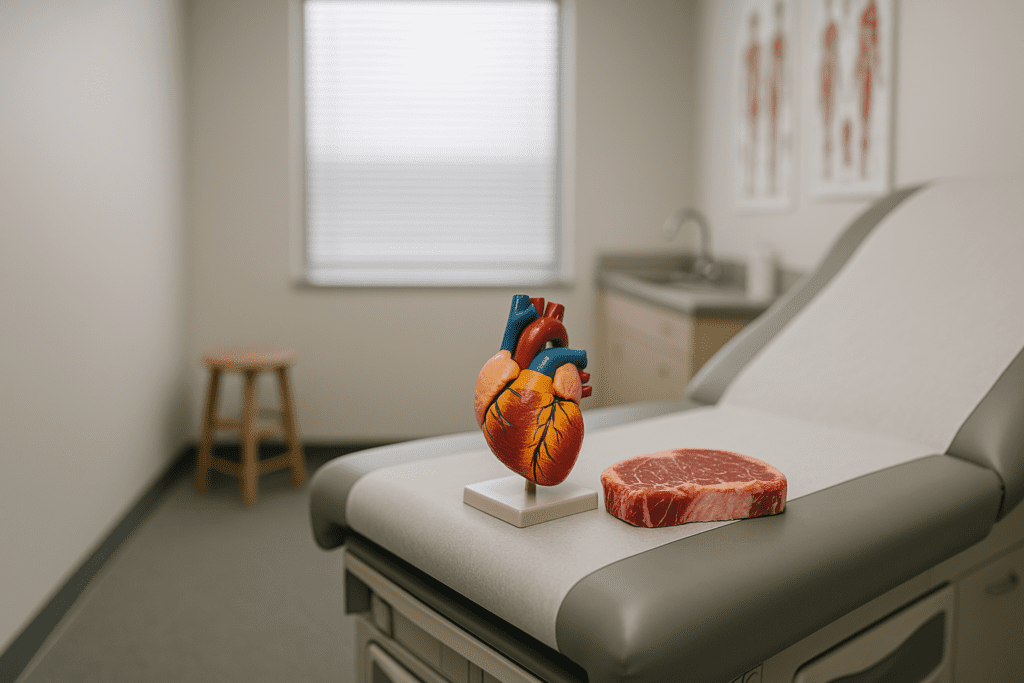The carnivore diet, an eating plan that eliminates plant-based foods and focuses exclusively on animal products, has gained traction in recent years as a means of achieving rapid weight loss, improving mental clarity, and addressing autoimmune conditions. However, despite its growing popularity, concerns about how the carnivore diet affects cholesterol levels and heart health remain a pressing issue for both health professionals and individuals considering this restrictive dietary approach. While proponents of the diet claim that it can lead to improved health markers, skeptics argue that the high intake of saturated fat and cholesterol may pose significant risks, particularly for cardiovascular health. This article explores the impact of the carnivore diet on cholesterol levels, assesses its implications for heart health, and provides evidence-based insights to help readers make informed decisions about their dietary choices.
You may also like: How a Vegan Diet Can Help Reverse Heart Disease: What the Science Says
Understanding Cholesterol and Its Role in the Body
To assess the impact of the carnivore diet on cholesterol levels, it is essential to first understand the role cholesterol plays in the body. Cholesterol, a waxy, fat-like substance, is produced naturally by the liver and is also found in animal-based foods such as meat, eggs, and dairy products. It serves vital functions, including the production of cell membranes, hormones, and vitamin D. Cholesterol is transported through the bloodstream by two main types of lipoproteins: low-density lipoprotein (LDL) and high-density lipoprotein (HDL).
LDL cholesterol, often referred to as “bad cholesterol,” transports cholesterol to the arteries, where it can accumulate and form plaques. These plaques can narrow the arteries, restrict blood flow, and increase the risk of heart disease and stroke. Conversely, HDL cholesterol, known as “good cholesterol,” carries excess cholesterol back to the liver, where it is broken down and removed from the body. Maintaining a healthy balance between LDL and HDL cholesterol is essential for cardiovascular health, and dietary choices play a significant role in influencing these levels.

The Carnivore Diet and Cholesterol: Exploring the Connection
The carnivore diet’s potential to impact cholesterol levels stems from its high intake of saturated fats, which are found abundantly in red meat, organ meats, and full-fat dairy products. Numerous studies have demonstrated that diets high in saturated fat can elevate LDL cholesterol levels, potentially increasing the risk of atherosclerosis and heart disease. However, supporters of the carnivore diet argue that the relationship between dietary saturated fat and heart disease is more complex than previously thought and may not apply universally.
Research examining the effects of the carnivore diet on cholesterol is still limited, but anecdotal evidence suggests that many individuals following this diet experience a rise in LDL cholesterol. This phenomenon has led to concerns about whether the carnivore diet raises cholesterol to dangerous levels and whether these changes in lipid profiles translate into an increased risk of cardiovascular disease. Furthermore, some advocates argue that while LDL cholesterol may rise, HDL cholesterol levels and other markers of metabolic health may also improve, potentially mitigating the associated risks.

Does the Carnivore Diet Raise Cholesterol?
One of the most frequently asked questions about the carnivore diet is, does the carnivore diet raise cholesterol? The answer is not straightforward and depends on various factors, including individual genetics, baseline health status, and overall dietary composition. Studies investigating the effects of low-carbohydrate, high-fat diets, such as ketogenic and carnivore diets, have shown that LDL cholesterol tends to increase in many participants. However, these diets can also lead to improvements in HDL cholesterol levels, triglycerides, and inflammatory markers, which are critical indicators of cardiovascular health.
In a 2020 study published in Current Developments in Nutrition, researchers analyzed the lipid profiles of individuals following a carnivore diet for six months. The study found that while LDL cholesterol increased in most participants, there were also significant improvements in HDL cholesterol and reductions in triglyceride levels. These findings suggest that while the carnivore diet may raise LDL cholesterol, it may simultaneously improve other lipid parameters that contribute to cardiovascular risk assessment.

Carnivore Diet and High Cholesterol: Cause for Concern?
Concerns about the carnivore diet and high cholesterol are not unfounded, particularly for individuals with a genetic predisposition to hypercholesterolemia or a history of cardiovascular disease. High LDL cholesterol is a well-established risk factor for atherosclerosis, and persistently elevated levels can increase the likelihood of heart attacks and strokes. Therefore, for individuals who experience a sharp increase in LDL cholesterol while following the carnivore diet, it is essential to assess the broader context of their lipid profile and other cardiovascular risk markers.
In some cases, a phenomenon known as “lean mass hyper-responders” (LMHR) may explain the increase in cholesterol observed in carnivore diet followers. LMHRs are individuals who experience significant increases in LDL cholesterol and HDL cholesterol while maintaining low triglycerides and favorable metabolic markers. While the long-term implications of this pattern are not yet fully understood, some experts believe that the improved HDL-to-LDL ratio and reduced inflammation may offset the potential risks associated with high LDL cholesterol.
How to Lower Cholesterol on a Carnivore Diet
For individuals concerned about the impact of the carnivore diet on their cholesterol levels, there are strategies that may help mitigate these effects. Understanding how to lower cholesterol on a carnivore diet involves making targeted adjustments to the types of animal products consumed and focusing on nutrient-dense options that promote cardiovascular health. Incorporating leaner cuts of meat, increasing the intake of omega-3 fatty acids from fatty fish, and including organ meats rich in vitamins and minerals can contribute to a more balanced lipid profile.
Additionally, reducing the intake of processed and cured meats, which are often high in sodium and preservatives, can further support heart health. Another strategy involves incorporating intermittent fasting or time-restricted eating, which has been shown to improve lipid profiles and promote metabolic flexibility. While fiber is typically absent in the carnivore diet, individuals concerned about cholesterol may consider adding small amounts of low-carbohydrate, fiber-rich foods such as chia seeds or psyllium husk to promote bile acid excretion and reduce LDL cholesterol levels.
Potential Benefits and Risks: Weighing the Evidence
Evaluating the potential benefits and risks of the carnivore diet requires a comprehensive understanding of its impact on various health markers. While some individuals report improvements in autoimmune conditions, weight loss, and mental clarity, others experience concerns related to elevated cholesterol levels and possible nutrient deficiencies. One of the notable benefits of the carnivore diet is its ability to reduce inflammation and stabilize blood sugar levels, which can indirectly improve heart health. By eliminating processed carbohydrates and sugars, the carnivore diet may help individuals manage insulin resistance and reduce markers of chronic inflammation.
However, the risks associated with prolonged adherence to a carnivore diet should not be overlooked. A lack of dietary fiber can negatively impact gut health, leading to imbalances in the gut microbiome and a reduction in beneficial short-chain fatty acids. Additionally, the absence of antioxidants and phytonutrients found in plant-based foods may deprive the body of essential compounds that protect against oxidative stress and inflammation. As a result, individuals considering the carnivore diet should carefully monitor their health markers and consider periodic reassessment with healthcare professionals.
Carnivore Diet and Heart Health: What the Research Says
When evaluating the relationship between the carnivore diet and heart health, it is crucial to consider both short-term and long-term outcomes. While short-term improvements in insulin sensitivity and inflammation markers may provide initial benefits, the potential long-term effects of sustained high LDL cholesterol and a lack of dietary diversity remain a concern. Long-term adherence to a diet devoid of plant-based foods may lead to nutrient deficiencies and an increased risk of chronic diseases, including cardiovascular disease.
Emerging research suggests that while low-carbohydrate, high-fat diets can improve certain metabolic markers, they may not be suitable for everyone. A 2021 study published in the American Journal of Clinical Nutrition highlighted that individuals following a high-fat diet experienced a significant increase in LDL cholesterol, which persisted over time. These findings underscore the importance of personalized approaches to dietary choices, as individual responses to dietary fat intake can vary widely based on genetics and baseline health status.
Practical Tips for Monitoring Cholesterol on a Carnivore Diet
For those who choose to follow the carnivore diet, regular monitoring of cholesterol levels and other cardiovascular risk markers is essential. Engaging in routine blood tests to assess LDL, HDL, triglycerides, and inflammatory markers can provide valuable insights into the body’s response to the diet. In addition to lipid profiles, tracking markers such as C-reactive protein (CRP), insulin sensitivity, and calcium scores can offer a more comprehensive assessment of cardiovascular risk.
Individuals who experience a significant increase in LDL cholesterol while following the carnivore diet may consider adjusting their dietary composition, incorporating more monounsaturated fats, and exploring intermittent fasting protocols. Consulting with a healthcare professional or registered dietitian who specializes in lipidology can help tailor the dietary approach to individual needs and minimize potential risks.
Finding a Balanced Approach: Moderation and Personalization
While the carnivore diet may offer benefits for certain individuals, it is essential to approach dietary choices with a balanced perspective that considers individual health goals, risk factors, and long-term sustainability. Moderation and personalization are key to optimizing heart health while minimizing potential risks associated with extreme dietary restrictions. For some individuals, transitioning to a more flexible low-carbohydrate or ketogenic diet that includes non-starchy vegetables and fiber-rich foods may provide a better balance between metabolic health and cardiovascular risk management.
Incorporating periodic blood tests and working closely with healthcare providers can help ensure that dietary choices align with individual health objectives. By adopting a nuanced approach that emphasizes nutrient density, metabolic flexibility, and cardiovascular risk assessment, individuals can make informed decisions that support long-term health and well-being.
Frequently Asked Questions (FAQ) About the Carnivore Diet and Cholesterol
1. Does the Carnivore Diet Raise Cholesterol Levels in Everyone?
Not everyone experiences a significant rise in cholesterol levels on the carnivore diet. Individual responses to dietary changes, particularly a high intake of saturated fat, can vary widely based on genetic factors, metabolic health, and baseline lipid profiles. For some, LDL cholesterol levels may rise considerably, while others may experience more modest changes. Individuals classified as “lean mass hyper-responders” (LMHRs) tend to see dramatic increases in LDL cholesterol on high-fat, low-carbohydrate diets, but they also often experience improvements in HDL cholesterol and reductions in triglycerides. While the carnivore diet may raise cholesterol in some people, it is essential to look beyond LDL levels alone and assess the broader context of cardiovascular health markers.
2. How Can I Lower Cholesterol on a Carnivore Diet Without Compromising Its Benefits?
For individuals wondering how to lower cholesterol on a carnivore diet, there are several strategies that may help optimize lipid profiles without abandoning the diet entirely. One approach is to prioritize the consumption of fatty fish rich in omega-3 fatty acids, which can help balance omega-6 to omega-3 ratios and improve cardiovascular health. Additionally, incorporating intermittent fasting or time-restricted eating may promote better lipid metabolism by enhancing insulin sensitivity. Some individuals have reported improvements by focusing on leaner cuts of meat and limiting processed or cured meats, which may be high in preservatives that contribute to inflammation. Another lesser-known technique involves increasing dietary choline from organ meats, which supports liver function and may enhance bile acid metabolism, aiding cholesterol regulation.
3. Can a Carnivore Diet Improve HDL Cholesterol Levels?
Yes, the carnivore diet often leads to an increase in HDL cholesterol, which is considered beneficial for heart health. HDL cholesterol plays a critical role in transporting excess cholesterol back to the liver for excretion, thus preventing the accumulation of plaques in the arteries. Studies on low-carbohydrate, high-fat diets, including the carnivore diet, suggest that increased dietary intake of saturated fats can raise HDL cholesterol levels while reducing inflammation markers. However, while a rise in HDL cholesterol is generally viewed as favorable, it is essential to evaluate the overall lipid profile and not rely solely on HDL as a marker of cardiovascular health. For individuals experiencing high LDL cholesterol alongside elevated HDL, further investigation into their overall risk profile is warranted.
4. Are There Risks Associated with High LDL Cholesterol on a Carnivore Diet?
High LDL cholesterol, commonly observed in those following the carnivore diet, can pose potential risks, especially for individuals with a genetic predisposition to hypercholesterolemia or existing cardiovascular conditions. LDL cholesterol, when elevated for prolonged periods, may contribute to the formation of arterial plaques, leading to atherosclerosis and an increased risk of heart disease and stroke. However, context is key—factors such as inflammation, insulin sensitivity, and HDL levels should be considered alongside LDL measurements to assess overall cardiovascular risk accurately. For individuals concerned about carnivore diet high cholesterol, incorporating more monounsaturated fats and monitoring inflammation markers can help mitigate potential risks while maintaining the benefits of the diet.
5. How Long Does It Take for Cholesterol Levels to Stabilize on a Carnivore Diet?
The timeline for cholesterol stabilization on the carnivore diet varies among individuals and depends on factors such as metabolic health, genetics, and adherence to the diet. In most cases, cholesterol levels tend to increase within the first few months of starting the diet as the body adapts to using fat as a primary fuel source. However, after an initial period of adjustment, lipid profiles may stabilize, with improvements in HDL cholesterol and triglyceride levels often observed. For some, this process may take six to twelve months, while others may experience prolonged elevation of LDL cholesterol. Regular monitoring of lipid panels and inflammatory markers is crucial during this period to assess individual responses and make appropriate adjustments if necessary.
6. Is It Possible to Follow a Carnivore Diet with Lower Saturated Fat to Reduce Cholesterol?
Yes, it is possible to modify the carnivore diet by focusing on leaner sources of animal protein and incorporating monounsaturated fats to reduce saturated fat intake. Opting for grass-fed lean beef, poultry, and fish can help maintain the core principles of the diet while mitigating the impact of high saturated fat consumption on LDL cholesterol. Incorporating fatty fish rich in omega-3 fatty acids, such as salmon or mackerel, can further support heart health by reducing inflammation and improving lipid profiles. For individuals concerned about how to lower cholesterol on a carnivore diet, this modified approach allows them to enjoy the benefits of the diet while addressing potential cholesterol concerns.
7. Can the Carnivore Diet Be Combined with Fiber Supplements to Lower Cholesterol?
While the carnivore diet inherently lacks fiber due to the exclusion of plant-based foods, some individuals incorporate low-carbohydrate, fiber-rich supplements such as psyllium husk or chia seeds to support cholesterol management. These soluble fiber sources bind with bile acids in the digestive tract, promoting the excretion of cholesterol and lowering LDL levels. Although purists may argue that introducing plant-derived fiber supplements deviates from the core principles of the carnivore diet, those concerned about carnivore diet high cholesterol may find this approach beneficial for improving lipid profiles without significantly altering the overall dietary framework.
8. Does the Carnivore Diet Impact Triglyceride Levels Differently Than Cholesterol?
Yes, the carnivore diet tends to have a distinct impact on triglyceride levels compared to its effects on cholesterol. Many individuals experience a substantial reduction in triglycerides within weeks of adopting a carnivore diet due to the elimination of refined carbohydrates and sugars. Elevated triglyceride levels are often associated with insulin resistance and metabolic syndrome, and by drastically reducing carbohydrate intake, the carnivore diet helps normalize these markers. While triglyceride reduction is generally seen as a positive outcome, individuals should still monitor their complete lipid profiles, particularly when LDL cholesterol increases concurrently.
9. What Role Does Inflammation Play in Assessing Cholesterol Risk on a Carnivore Diet?
Inflammation plays a critical role in determining the overall cardiovascular risk associated with high cholesterol levels. Chronic inflammation can exacerbate the development of atherosclerosis by contributing to the formation of arterial plaques and increasing oxidative stress. While the carnivore diet and cholesterol changes may lead to higher LDL levels in some individuals, the diet also tends to reduce markers of inflammation, such as C-reactive protein (CRP). Therefore, it is essential to evaluate inflammation levels alongside lipid panels to assess cardiovascular risk more comprehensively. Individuals with elevated LDL cholesterol but low CRP and other inflammatory markers may face a lower overall risk than those with persistent inflammation.
10. Can Intermittent Fasting Enhance the Benefits of a Carnivore Diet for Cholesterol Management?
Yes, incorporating intermittent fasting alongside the carnivore diet may amplify its benefits for cholesterol management and metabolic health. Intermittent fasting promotes autophagy, a cellular process that removes damaged cells and supports overall metabolic efficiency. It can also enhance insulin sensitivity and improve lipid metabolism, leading to more favorable cholesterol profiles. For those exploring how to lower cholesterol on a carnivore diet, combining intermittent fasting with a nutrient-dense carnivore approach may optimize lipid markers and reduce cardiovascular risk. Additionally, fasting can enhance the body’s ability to utilize fat for fuel, which may help stabilize cholesterol levels over time.
Conclusion: Balancing the Risks and Rewards of the Carnivore Diet for Heart Health
The carnivore diet presents a complex interplay between potential health benefits and cardiovascular risks, particularly concerning its effects on cholesterol levels. While some individuals experience favorable changes in metabolic markers and inflammation reduction, others may encounter increased LDL cholesterol, raising concerns about long-term heart health. Understanding how to lower cholesterol on a carnivore diet and making informed adjustments to dietary choices can help mitigate these risks while preserving the potential benefits of the diet. As with any dietary approach, personalization, regular monitoring, and collaboration with healthcare professionals are essential to achieving optimal health outcomes. By weighing the evidence and embracing a balanced, individualized approach, individuals can navigate the complexities of the carnivore diet and make choices that align with their health goals and values.
carnivore diet health effects, high-fat low-carb diet and heart health, saturated fat and cholesterol levels, LDL and HDL balance, cholesterol management strategies, carnivore diet for metabolic health, risks of high LDL cholesterol, lean mass hyper-responders and cholesterol, cholesterol-lowering techniques, heart health on high-fat diets, inflammation and cardiovascular risk, omega-3 fatty acids for heart health, triglycerides and low-carb diets, autophagy and metabolic efficiency, intermittent fasting for cholesterol, nutrient balance on carnivore diet, personalized dietary approaches, cholesterol monitoring on meat-based diets, low-carb diets and inflammation, cardiovascular risk assessment with high cholesterol
Further Reading:
Is the carnivore diet bad for cholesterol?
The Carnivore Diet: What You Need to Know
All You Need to Know About the Carnivore (All-Meat) Diet
Disclaimer
The information contained in this article is provided for general informational purposes only and is not intended to serve as medical, legal, or professional advice. While NewsHealthWatch strives to present accurate, up-to-date, and reliable content, no warranty or guarantee, expressed or implied, is made regarding the completeness, accuracy, or adequacy of the information provided. Readers are strongly advised to seek the guidance of a qualified healthcare provider or other relevant professionals before acting on any information contained in this article. NewsHealthWatch, its authors, editors, and contributors expressly disclaim any liability for any damages, losses, or consequences arising directly or indirectly from the use, interpretation, or reliance on any information presented herein. The views and opinions expressed in this article are those of the author(s) and do not necessarily reflect the official policies or positions of NewsHealthWatch.

